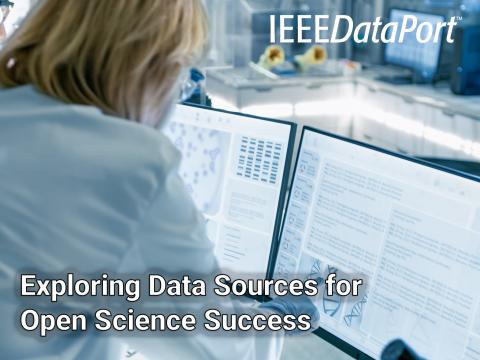Best Practices for Leveraging Research Databases
Research databases are the backbone of academic institutions, powering breakthroughs across diverse fields like artificial intelligence, healthcare, and climate science. However, effectively leveraging these resources poses challenges for researchers and institutions alike. Whether you're managing vast datasets, collaborating across disciplines, or chasing funding opportunities, understanding the nuances of research databases is vital.
This blog offers actionable insights into the best practices for using research databases to their fullest potential. From learning advanced search techniques to streamlining data management with tools like IEEE DataPort, this post is your comprehensive guide to academic database mastery.
Understanding the Basics
Before diving into best practices, it's essential to understand the basics of research databases. These digital platforms contain a vast collection of scholarly articles, conference proceedings, and other resources that can be searched and accessed by researchers. Most databases provide advanced search options, including Boolean operators and filters, making it easier to find relevant information quickly.
Familiarize Yourself with Database Features
Every database offers unique features that can enhance your research experience. For instance, some platforms allow you to save searches or set up alerts for specific topics or authors. Others offer citation tracking capabilities or integrate with popular reference management tools like EndNote or Mendeley.
What Are Research Databases?
Research databases, also known as academic databases, are curated collections of scholarly resources, datasets, and articles designed to support rigorous academic research. Unlike general internet searches, research databases provide controlled access to credible and peer-reviewed content.
Some frequently used research databases include IEEE Xplore, PubMed, JSTOR, and EBSCOhost. These platforms house an extensive library of research datasets, journal articles, and public datasets. For scientists and academics looking to meet robust academic standards, these resources are indispensable.
Why Research Databases Excel Over General Search Engines
Unlike platforms like Google, research databases ensure that users are accessing reliable, high-quality materials. These platforms are built to provide features like Boolean search operators, metadata tagging, and citation tools, making them far more comprehensive and reliable for academic work.
Platforms like IEEE DataPort enable access to datasets for research with curated metadata, ensuring researchers can quickly find, verify, and utilize credible information. By facilitating ethical sourcing and offering tools for reproducibility, research databases are central to academic success. (Learn more about the role of IEEE DataPort in advancing research here.)
Why Research Databases Matter
The importance of research databases lies in their ability to elevate academic initiatives through credible resources, functionality, and collaboration opportunities. Here’s how they make a difference.
Credibility: These databases provide access to peer-reviewed research, eliminating the false or unverified content that often populates general searches.
Collaboration: Research databases enhance institutional partnerships by offering tools for shared access and group work.
Data Management: Advanced storage, tagging, and search functionalities streamline data organization, ensuring that researchers find the right materials faster.
Institutions like universities and research centers can foster innovation and discovery using academic databases for research, ultimately streamlining the path to impactful discoveries. More insights are available in this article on the importance of high-quality datasets for global research (explore here).
Challenges in Utilizing Research Databases
While invaluable, research databases come with their challenges. Below are some common hurdles and potential solutions.
Navigating Complexity: Advanced search techniques and interfaces are often a barrier to entry. As a solution, research database providers offer training resources to help users become proficient in leveraging their platforms.
Data Management Dilemmas: Large datasets require significant storage space, making organization and management challenging. To circumvent this challenge, IEEE DataPort offers unlimited storage for researchers at academic institutions worldwide.
Best Practices for Leveraging Research Databases Effectively
Now that we understand the importance of research databases let's explore some best practices for using them effectively:
Practice Advanced Searching: Boolean operators enable users to fine-tune searches, allowing you to filter by keywords or phrases effectively.
1. Complex Search Interfaces
Navigating the advanced functionalities of academic research databases often overwhelms new users. Boolean operators, filters, and metadata tagging are powerful but can feel intimidating without proper guidance.
2. Data Management Overload
With institutions generating more data than ever before, managing vast volumes can feel like an insurmountable task. Storing, organizing, and maintaining these library datasets further complicates the landscape.
3. Accessibility Issues
For smaller institutions or independent researchers, limited budgets often mean restricted access to database subscriptions or tools for managing datasets in research.
4. Lack of Awareness of Features
Even experienced researchers may underutilize features like citation tools, collaboration options, or dataset libraries, leaving potential efficiencies untapped.
Solutions
Training initiatives and centralized platforms like IEEE DataPort help mitigate these issues. By employing customizable access levels, extensive data storage, and advanced search tools, institutions can simplify and streamline research workflows (read more here).
7 Best Practices for Leveraging Research Databases
Understand Advanced Search Features
The most effective use of research databases begins with mastering advanced search functionalities. Boolean operators like AND, OR, and NOT narrow or broaden search results to ensure precision. Filters for year, publication type, or language help users focus on the most relevant research articles.
Platforms like IEEE DataPort are equipped with powerful search capabilities to help locate specific datasets efficiently. Discover how to optimize your search strategy here.
Utilize Citation Tools
Most research databases include citation tools, which simplify building reference lists and ensure proper attribution in your work. Software like EndNote, Zotero, and Mendeley integrates seamlessly with platforms like IEEE Xplore, allowing you to organize, store, and manage citations efficiently (learn about these tools).
Stay Updated with New Publications
Institutions that maintain research article databases often allow users to set alerts for specific keywords or authors. This ensures researchers stay informed about the latest advancements in their field.
Collaborate with Institutional Librarians
Make the most of your institution’s resources by collaborating with librarians. They often provide invaluable training on managing library datasets and utilizing academic tools to simplify your research workflows (read more).
Organize and Manage Data Efficiently
Maintaining data integrity calls for reliable platforms like IEEE DataPort, which streamline dataset storage, tagging, and categorization. Access to tools like private groups and data management plans (DMPs) further enhances efficiency, and you can explore more on that topic here.
Leverage Public Datasets When Necessary
Adding open-access public datasets through IEEE DataPort can supplement existing data and enhance research findings. With a vast repository of datasets, IEEE DataPort provides an efficient solution for researchers seeking high-quality data. (discover more).
Evaluate and Compare Databases
Every research discipline is unique, so selecting the right academic research database requires careful evaluation. Consider usability, scalability, and accessibility when choosing platforms like IEEE DataPort over generic repositories.
How IEEE DataPort Simplifies Research Database Management
Among available platforms, IEEE DataPort stands out by addressing the challenges previously outlined.
Centralized Resource: IEEE DataPort includes thousands of datasets that facilitate collaboration among a global community.
Customizable Access Levels: Researchers can manage data privacy while still permitting access to global contributors.
Advanced Data Tools: The platform supports FAIR principles, ensuring datasets are findable, accessible, interoperable, and reusable.
Institutions already leveraging IEEE DataPort report significant improvements in data efficiency and collaborative output. For detailed features, visit IEEE DataPort here.
The Future of Research Databases
Emerging technologies are set to redefine the role of research databases in academic settings. Innovations such as AI-driven predictive analytics, machine learning, and natural language processing will transform data searches into highly tailored, real-time experiences.
However, these advancements also raise ethical concerns, including privacy compliance and algorithmic bias. Addressing these issues while fostering innovation will be a defining challenge for the coming decade. For a deeper look into the evolution of research databases, visit IEEE insights.
Unlock New Discoveries with IEEE DataPort’s Advanced Research Databases
Research databases empower academic success by offering tools for collaboration, discovery, and data management. Platforms like IEEE DataPort go beyond traditional repositories, providing innovative solutions for institutional challenges.
- 4 reads



